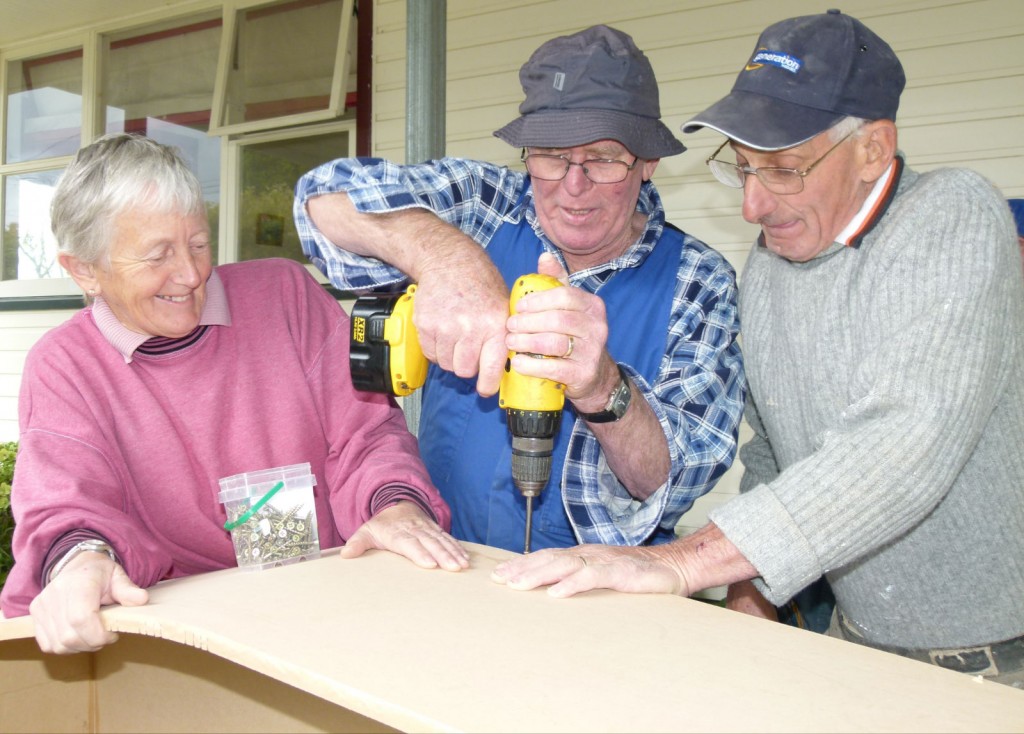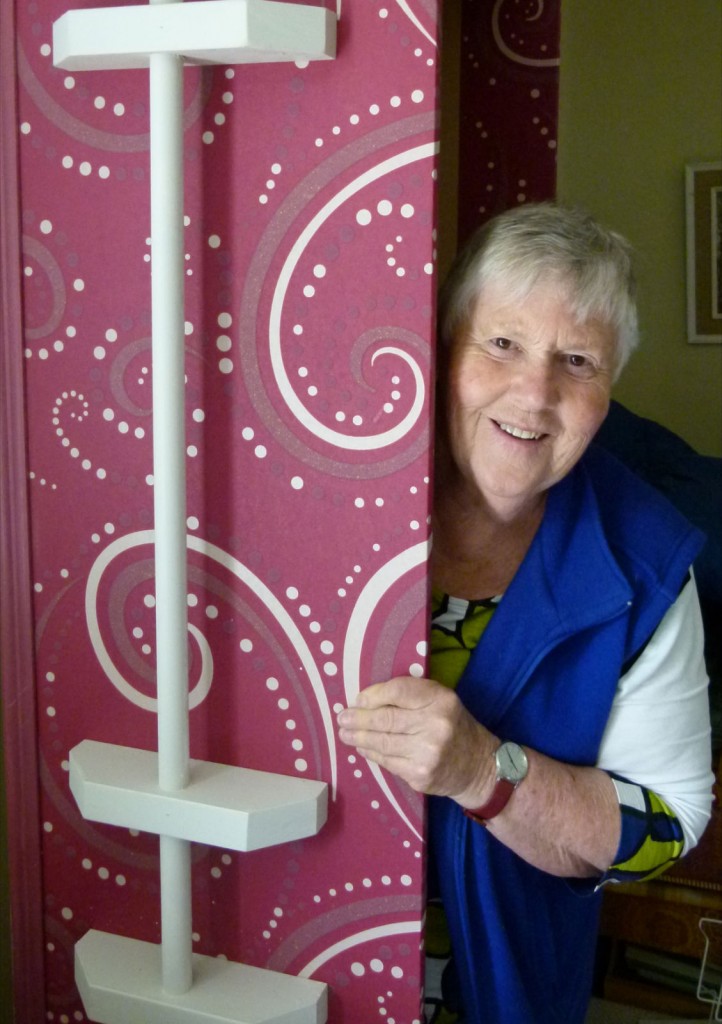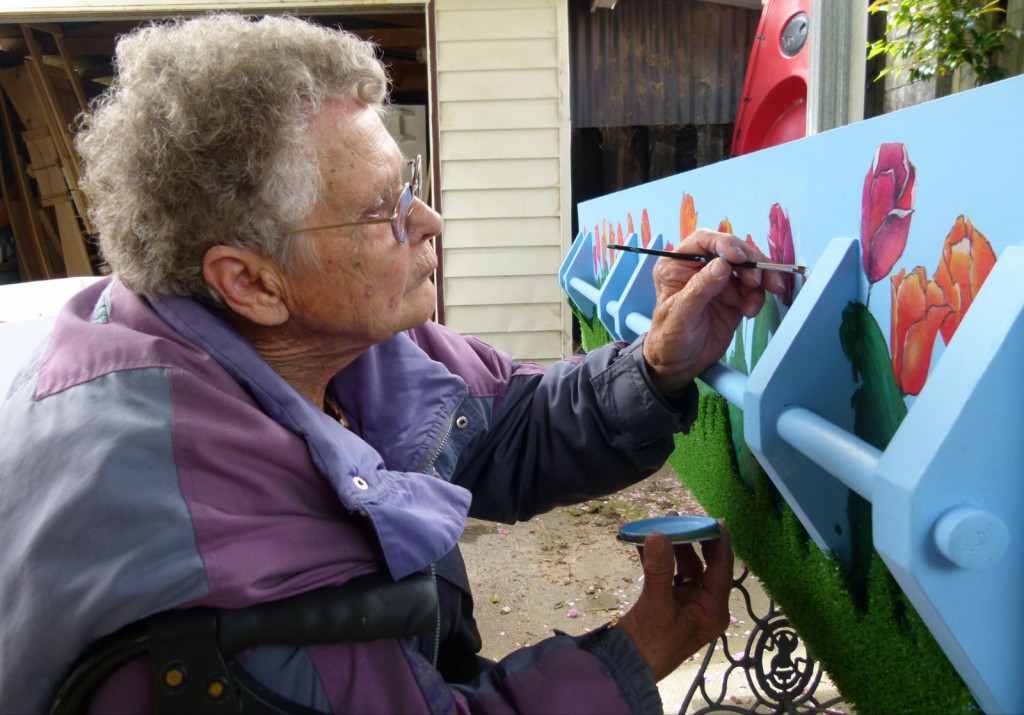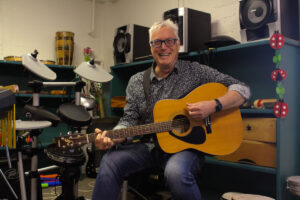Join the coffin club
A group of Rotorua people know just where they’re heading – and have the caskets to prove it.
Stacked side by side in the cluttered garage are eight coffins. One has artificial grass glued around the sides with the sky painted above it, another is wrapped in cream embossed wallpaper with a gold cross on the front and a third sits perched atop the rest with a swatch of blue fabric draped over it.

The blue fabric, a cut-off from an old duvet found at a garage sale, is to remind Francisca Hawkes-Buchanan of the colour her son wants his coffin. Once she has painted it Francisca, 82, will glue a large purple and pink dragon decoration her son chose to the top.
Steven, her 55-year-old son, does not understand death and may never. He is intellectually disabled and has never experienced a death close to him.
Francisca used to lie awake at night thinking about how Steven would survive when she dies. She has bought him a home, organised for his brother to take care of the bills, bought him a plot at the cemetery and accepted that it is the best she can do under the circumstances. The last step was building his coffin.
Francisca hopes making the coffin has helped him to understand death but if honest with herself she fears he will still be lost without her.
Sitting beside her close friend Katie Williams in a living room crammed with couches, stacks of newspaper and family photos Francisca looks sad for a moment, then blinks and launches into story about using a coffin as a wine-rack.

The pair became close friends when Katie, 72, started a coffin club 18 months ago. Already they have helped around 70 people build and decorate their coffins on a budget. But bargain hunter Katie insists it is not just about “doing it on the cheap”. She says it is a way for older people to come to terms with death and stay in control right up to the end.
“A lot of older people try and tell their family what they want when they die but are brushed off by their children saying don’t talk about that or you’re not going to die. We just want to know everything is going to be okay when we go.”
Katie heads the club with the help of Francisca who never left after building her and Steven’s coffins. They are assisted by a team of volunteer builders who show up to Katie’s backyard dutifully every Wednesday morning to cut, bend and assemble the custom wood cut-outs into coffins. The rest are a mix of people building their own coffins or those who have found a sense of family within the club. There each week helping to hold the screws in place for the ex-tradesmen whose eyes are no longer so sharp, bringing food for the volunteers or simply for the company.
Dora Crown, 82, finished building her coffin, which she uses as a bookcase for her bibles, some time ago. After moving retirement homes to be closer to the club she still comes back each week perched on her walker, chatting away to the men as they work.
Sitting in her crowded home, Katie confesses with two dogs and the club she doesn’t have time to clean and prefers her home to be well lived in. Her own coffin, a wallpapered fuchsia affair with black and white swirls, lives in a small room beside the garage. On the lid of the coffin she has painted her mantra in life – Live Love Laugh.
“I’ve never been a mahogany and gold kind of girl,” she says.
Katie says each coffin has a story behind it.
“One woman made a coffin for her 42-year-old daughter who was dying and we’ve had whole families help decorate them. Another woman had her granddaughter, who was a fine arts student, paint beautiful daisies all over it.”
The coffins cost around $160 to build, minimal compared with a standard coffin which is about $3600.

Katie documents the entire process, giving a photo album and DVD to each person when they finish their coffin to remember the experience. But most people end up coming back long after their coffins are completed. The club has become a family to Katie who writes to everyone involved each week.
In the past 18 months the club has only taken one break. The morning before it was to restart Katie received call after call from volunteers anxious to make sure it was all go.
Volunteer builder Bruce McPike is something of a leader to the men. A retired joiner he uses his experience to help refine the building process and has created a system of handles for the coffins.
Before Bruce, 79, came on board the club members were making about one coffin a day, now they do around three. With fellow volunteer Bill Sharpe, Bruce has created a system that fashions broomsticks into handles for the coffins. Bill, also a former tradesman, designed the patent and Bruce jokes that together they have pioneered the “homemade coffin handle system”.
After his wife of 54 years Margaret died about a year ago Bruce was lonely and spent a lot of time volunteering to fill his days. Katie roped him into the coffin club in February last year at a luncheon when he overheard her saying the first coffin she tried to make didn’t fit together.
“She asked if he knew anything about building and like a fool I said yes,” he chuckles.
Joining the club has helped Bruce feel like part of a cause.
“I find the social side really nice now my wife has passed away.”
But he says the best part is working with wood and building again.
Before Margaret died Bruce built a second home for them to live in when they retired. The house now sits empty at the back of the property, but won’t be for much longer. Tucked away in his workshop amongst years of projects and scraps of wood are the beginnings of a home, two bedside cabinets expertly made and polished and the framing that will become a table to fill the hollow house.
But after years of working with timber Bruce isn’t sure if his last project will be his own custom wood coffin.
“I’ll just have to see about that.”
For now he will continue to spend his Wednesday mornings in the garden building other people’s coffins while Katie meets and greets the “newbies” making sure there is a coffin for everyone. And Francisca trails the men, a jar of screws in one hand and a cloth to wipe dust off the coffins in the other.
Only three of the 70 coffins the club has built are in their final resting place. Fifty nine live in people’s homes disguised as coffee tables or book cases. And the last eight are stacked in Katie’s garage in various stages of completion and decoration just waiting to be used.




